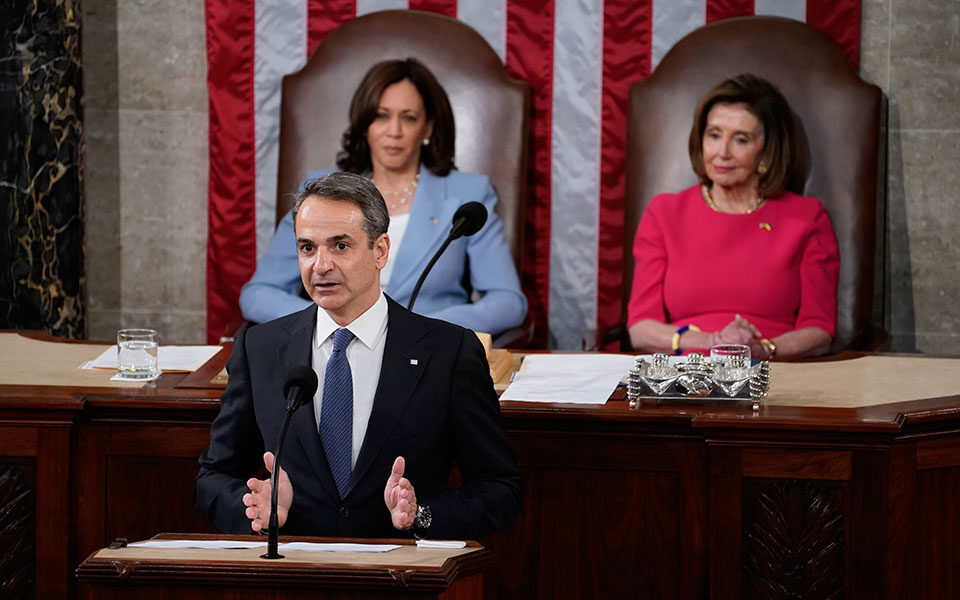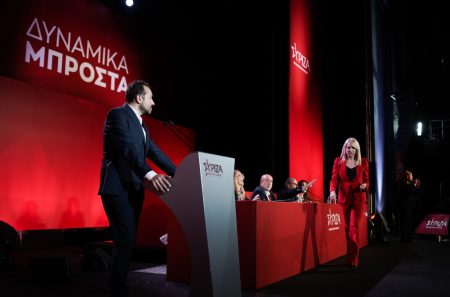In transitional periods characterised by geopolitical shifts and great dilemmas, nations, peoples, and leaders take a direct and clear stand without shilly-shallying or a Janus-faced stance of duplicitous neutrality.
Prime Minister Mitsotakis spoke in a plain and simple manner last Tuesday in his address to a Joint Session of the US Congress regarding the huge, ongoing geopolitical crisis that arose from Russia’s unjust invasion of Ukraine.
He appeared in Washington, the capital of Greece’s superpower ally, as an absolute exponent and member of the open, liberal and democratic Western world, supporting the universal principles of democracy, liberty, and equal justice before the law, and rejecting all forms of tyranny, authoritarianism, and revisionism.
He condemned the Russian invasion and took a clear stand without reservations in support of Ukraine’s independence and military aid to defend it.
In that context, he artfully wove into his speech critical issues pertaining to the rights of the Greek state, including the inviolability of our borders, the protection of our islands, and the creation of a single, unified state in Cyprus, which for 48 years has lived under the yoke of the continuing Turkish occupation that followed the 1974 invasion.
Undoubtedly, Mr. Mitsotakis’ speech was deeply ideological, imbued with the principles of liberal democracy.
That is why it was warmly welcomed by the members of the US Congress, drawing repeated standing ovations, but it also triggered a bitter and unseemly reaction from Ankara.
Turkey’s revisionist and authoritarian leader cannot comprehend or align himself with the principles of the West’s open, liberal and democratic culture. That is why he responds to the mere invocation of those principles with enraged outbursts.
Ankara’s autocratic exponent of contemporary revisionism cannot understand that in such a critical period Turkey cannot have its cake and eat it.
It cannot for very long undermine NATO and its military arsenal (by procuring Russian weapons systems that are incompatible with the Alliance’s, with which they compete) and at the same pursue the procurement of the most advanced American war planes, which Turkey obviously wants to deploy against a fellow NATO member, namely Greece.
Turkey cannot support the Islamic State, the most heinous and repugnant form of Islamic terrorism, and at the same time slam NATO and undermine at this critical and harsh juncture in the Russo-Ukrainian war the admission of Sweden and Finland, simply because they it tolerate the liberation struggle of the Kurds.
At a time when the struggle for women’s rights is still ongoing, Ankara is unable to understand that it cannot verbally attack the women prime ministers of these two countries, on the outrageous grounds that they promote feminism.
The truth be told, Turkey has fallen victim to its own choices, above all as regards the major challenges preoccupying the contemporary world. Its stance on issues at various times is based on a classic oriental model, without cognisance of the critical nature and impact of its decisions.
It constantly attempts to exploit and bargain using its geopolitical position, without regard for principles and rules.
If one examines Turkish policy over the last years, one will find that it constantly veers back and forth between friends and enemies, without ever reaching a stable position and orientation.
At one moment it is with the US, and the next it is bargaining with Russia. It recently clashed with the Gulf States and Israel and now seeks to cooperate with them.
Some years back, one of Turkey’s overarching goals was to pursue the path of EU membership, an aim it then abandoned and to which it has returned once again.
The issue with Turkey is one of trustworthiness and orientation. The myth of a supposedly extraordinarily successful Turkish diplomacy has collapsed under current conditions, just as it had during WWII.
Hence, neither Mr. Mitsotakis nor Greece are to blame.



